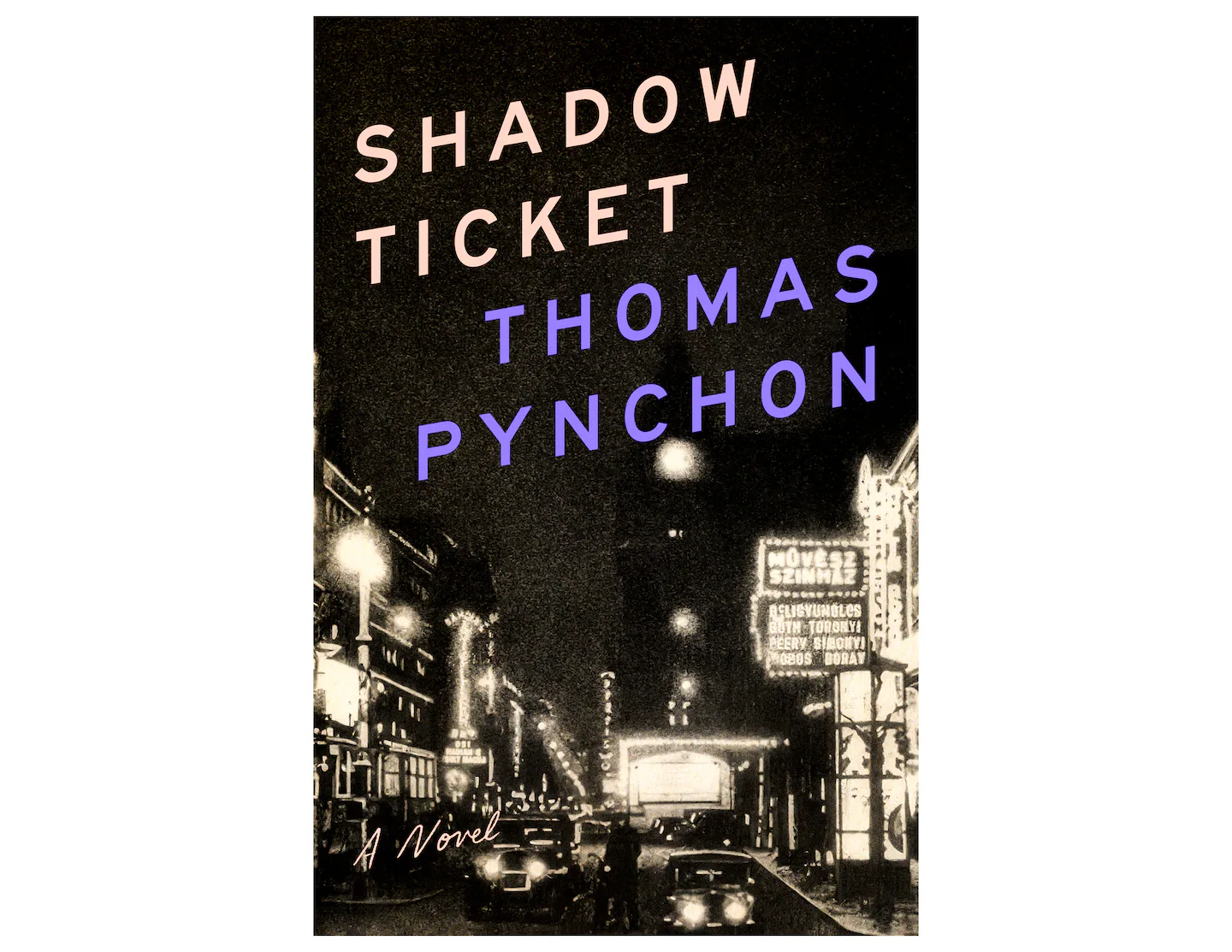
That in this his 88th year Thomas Pynchon has published another novel, set in Milwaukee, of all places, packed full of punny names per usual, featuring a lug of a detective, like the bruiser accompanying Marlowe rather than the smart guy himself, yet, or perhaps because of this, equally successful with women who flirt as exquisitely as they dance or sing or grift, in the Midwest and also Hungary, where he eventually ends up, dragged onto an ocean liner by his own bosses, or their bosses, the clarity of which sometimes seems almost within reach, is a literary triumph. Winding up in 1930s Europe, it’s hard to sort out who’s in power, but one thing is absolutely clear: The Nazis are the bad guys.
“Shadow Ticket” is the ninth novel by Pynchon, who won the National Book Award for his bricklike, brilliant “Gravity’s Rainbow” in 1974. Recently, his 1990 novel “Vineland” has been in the news as the loose inspiration for Paul Thomas Anderson’s film “One Battle After Another.” As his fans know, Pynchon has written some of the most wonderful, erudite, silly, imaginative, impossible books of the 20th and 21st century. I’m delighted to report that “Shadow Ticket” is a gloriously language-driven detective novel that waits for no one.
Hicks McTaggart is a strongman turned private detective in Milwaukee, out on the margins of the Chicago mob scene. The real power in Wisconsin is Bruno Airmont, “the Al Capone of Cheese,” whose empire-building misdeeds forced him underground. Bruno’s daughter, the beautiful and wayward Daphne, has run off with a clarinet player, and Hicks spends half the book dodging the assignment to track her down.
Advertisement
The lineup of Milwaukee characters include Hicks’s boss, a kind day drinker; his girlfriend, a singer who’d like him more if he were less available; a smart street kid; low-level gangsters and thieves; and old P.I. Lew Basnight, giving advice from his spot at a bar. “Just so long as you ain’t one of these metaphysical detectives, out looking for Revelation,” Lew cautions Hicks. “Get to reading too much crime fiction in the magazines, start thinking it’s all about who done it. What really happened. Hidden history. Oh, yeah. Seeing all the cards at the end of the hand. For some, that kinda thing gets religious mighty quick.”
Pynchon-heads will recognize Basnight from “Against the Day.” His complaint may ring true with academics and fans who’ve parsed Pynchon’s fiction, digging through the complex threads of paranoia, conspiracies, spies, counternarratives and hidden truths. Yes, we can get a little religious.
In fact Hicks is getting religious, in a way. He’s trying to do his job without killing anyone, after having a mystifying, mystical experience. A weapon dematerialized from his hand at a critical moment, and later reappeared in his pocket. A few detectives and magicians have recognized and identified the practice, which can be used for good — sparing a life — or bad — stealing something precious, like La Lampo Plej Malbongusto, a hideous lamp.
In Europe Hicks meets Zoltán von Kiss, who can actually enact this phenomenon, as well as a jaunty trio whose stage act of it is just stealing. They also sing — many songs here, original to the book (although the publisher has also created a Spotify playlist for the right 1930s vibe). He’s told he must find Daphne Airmont by his new boss, who spins himself into cocaine-fueled predictions about plots, alliances, and the future.
Advertisement
If sketching out conspiracies is classic Pynchon, he does something funny here: The stories stop before they get to the goods. Hicks tunes out, or he joins in — blackout or whiteout, the result is blankness in place of truths revealed. A little practical joke for the religious meaning-seakers.
As an investigator, Hicks takes his time. He floats through the cultural eddies of Budapest, going to jazz clubs and meeting a cute lady motorcyclist. He’s dogged by a pair of daffy Brits, spies of course, whose higher-ups’ higher-ups seem less than fixed. The big alliances, the mechanisms of war, they’re happening offstage.
But they’re happening, sometimes in ways that feel all too present. “Do you really not know?” one of the spies asks him. “Things will never go back to the way they were.” Later, he’s warned, “this year is when it all begins to come apart.” In unseen color footage, Hitler is “impulsive, unorthodox, says whatever comes into his head.” It all sounds somewhat current.
Eventually, Hicks tracks Daphne down. They have a connection, but she’s stubbornly in love with her musician boyfriend, Hop Wingdale. With few opportunities for jazz clarinets, Hop has taken a lousy gig entertaining the touring motorcyclists on the Trans-Trianon 2000. Hop being Jewish, and the route crossing dark, fascist-friendly forests, he’s in trouble he doesn’t realize. Hicks and two unlikely allies set out to save him.
Advertisement
A destination on their route is a seaside town full of people of various nationalities and cultures hoping to depart Europe. Of course, this being Pynchon, there are also mysterious travel conveyances, like a working autogyro flying machine. A wealthy criminal throws great parties where many of the book’s characters converge.
In place, they are located at the edge of Europe; in time, they are on the brink of a fascist takeover; and in literature, they are delivered to the edge of World War II and “Gravity’s Rainbow.”
Who could ask for more.
SHADOW TICKET
By Thomas Pynchon
Penguin Press, 304 pages, $30
Carolyn Kellogg, former books editor of the Los Angeles Times, is a writer and editor.



